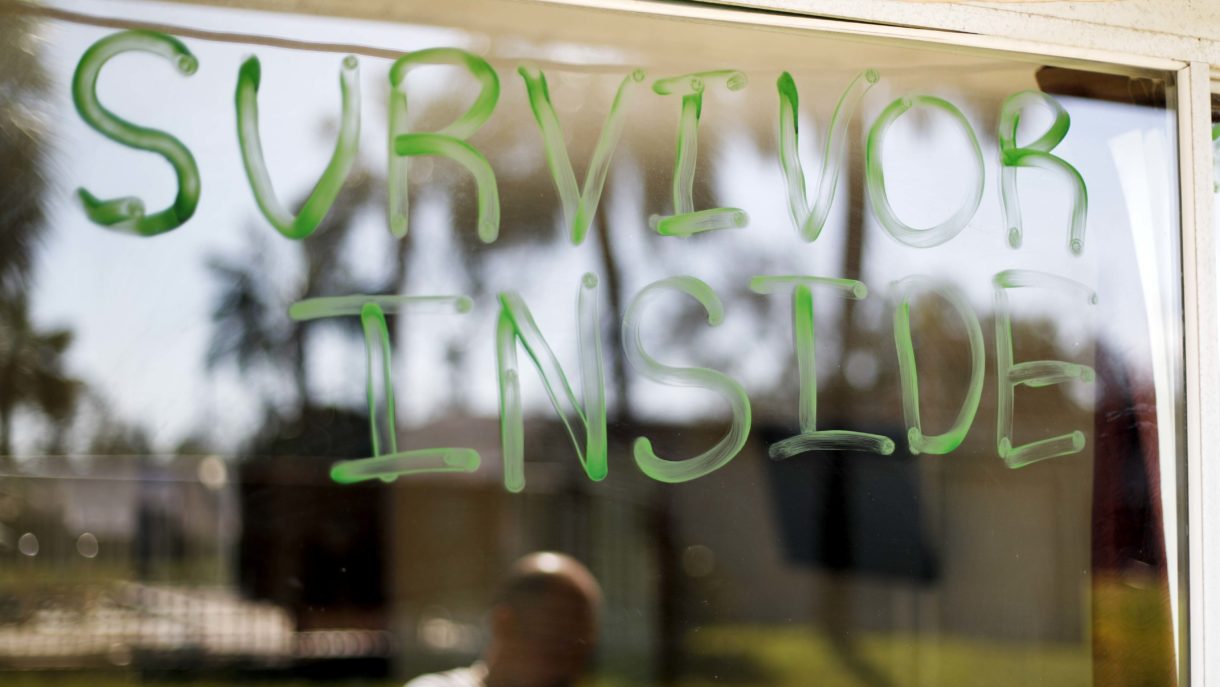Friends and family of people who live in the Florida panhandle are still trying to find out if their loved ones survived Hurricane Michael. The mission has been hampered by heavily damaged infrastructure and fractured communication systems.
Volunteer rescuer George Ruiz spent Thursday trying to locate people who had not been heard from since the devastating storm.
“It’s been a good day,” says Ruiz, retired from the U.S. Coast Guard. “I’ve done about 32 calls so far.”
Ruiz found each person alive, and doing the best they can under trying circumstances. People like Roxy Melvin.
“Usually we’re prepared for a week,” she says. “This is going to be more than a week unfortunately.”
Melvin’s cousin in Alabama contacted the website CrowdSource Rescue, because she had not heard from her uncle and other family living in Alford — a tiny Florida panhandle town about 60 miles inland.
“The cell service totally let us down,” says Roxy Melvin.
She says her daughter in Pennsylvania was frantic for several days until they finally got in touch by phone.
Roxy is staying with her elderly father, Jim Melvin. A tree fell through the roof of the house, and there’s water damage. Huge trees are down all over the property
Jim Melvin says, in 45 years, they’ve never seen such strong hurricane winds this far inland. And they’ve certainly never been cut off from the outside world like this.
“There’s no communication here,” says Melvin. “The cellphone might come on [for] an hour and go off, and be off 6 hours or more. You never knew when it’s coming or going.”
They’re OK, but Roxy Melvin says the inability to contact authorities had tragic consequences down their street where a man was killed by a tree that fell through his mobile home.
“He was alive when that tree fell on him. Some people were able to go speak to him, but he died,” she says. “He stayed in that trailer under that tree for almost 24 hours because we didn’t have the capability to get him out.”
They’re no longer hemmed-in by downed trees, but cell service is still spotty here and elsewhere in the hurricane-ravaged panhandle.
Some people are trying to connect through social media and web applications. There’s a Facebook page for people missing and separated by Hurricane Michael.
The web platform that rescuer George Ruiz uses, CrowdSource Rescue, allows people to report someone who is unaccounted for or needs help. It lists them on a map that rescuers can use for deployment purposes.
“We’re like a ride share company for disasters,” says company co-founder Matthew Marchetti.
He says volunteers have checked on more than 2,500 people in the aftermath of Hurricane Michael. It still lists more than 300 people as unaccounted for, so volunteers will be looking for them this weekend.
Hundreds of calls are also coming in to local law enforcement agencies that dispatch officers to make sure that people are okay.
“Family and friends all over the United States could not contact their loved one and feared the worst,” says Mark Bowen, Chief of Emergency Services for Bay County, Fla., “and so a tremendous number of welfare checks were requested.”
One of the people looking for help is Tracey Stinson of Fort Walton Beach. She hasn’t heard from her father who lives in Youngstown north of Panama City.
“You can’t help but wonder when so many people are missing,” Stinson says.
She says she’s tried all kinds of avenues to reach him, including the local grocery.
“I actually tried calling a store he shops at that’s near his home that was gone. So I was unable to reach them so then the next step was contact the sheriff’s office,” says Stinson. “I just kept calling every several hours to see if I could catch them with a phone line that was operating and there was no luck.”
Now she’s waiting to hear from the health department after filing a missing persons report.
Up in Alford, before George Ruiz of Geaux Rescue leaves the Melvin house, he unloads several cases of military meals ready to eat.
“If you’re going to check on somebody,” he says. “You’ve got to leave something for them because they’re stuck here for a reason.”
Roxy Melvin says it’s welcome relief after watching supply trucks drive past her rural community on their way to the more populated coast.
“It’s a blessing that we aren’t forgotten,” she says.
Melvin says the packaged food will come in handy. She’s been told not to expect her power back until Halloween.
9(MDEwNzczMDA2MDEzNTg3ODA1MTAzZjYxNg004))
